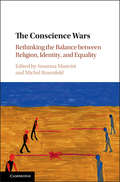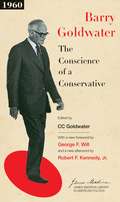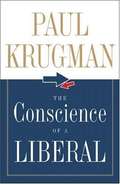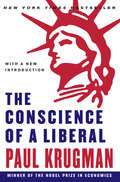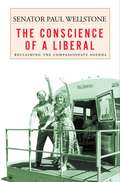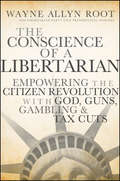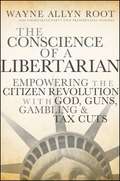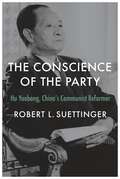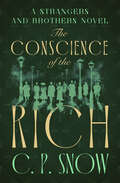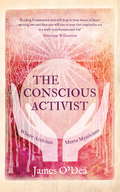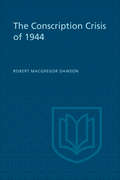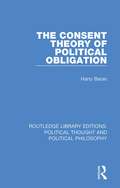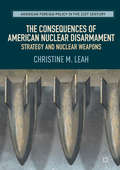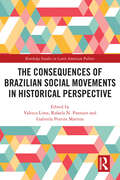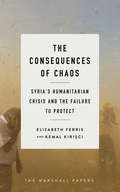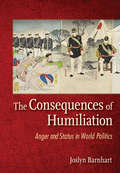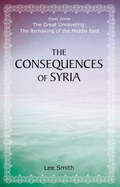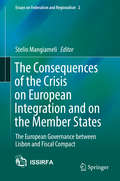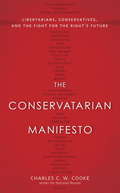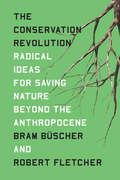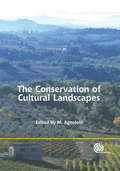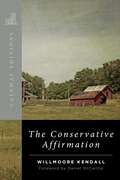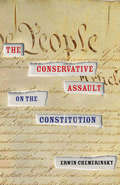- Table View
- List View
The Conscience Wars: Rethinking the Balance between Religion, Identity, and Equality
by Michel Rosenfeld Susanna ManciniIn this work, Professors Rosenfeld and Mancini have brought together an impressive group of authors to provide a comprehensive analysis on the greater demand for religions exemptions to government mandates. Traditional religious conscientious objection cases, such as refusal to salute the flag or to serve in the military during war, had a diffused effect throughout society. In sharp contrast, these authors argue that today's most notorious objections impinge on the rights of others, targeting practices like abortion, LGTBQ adoption, and same-sex marriage. The dramatic expansion of conscientious objection claims have revolutionized the battle between religious traditionalists and secular civil libertarians, raising novel political, legal, constitutional and philosophical challenges. Highlighting the intersection between conscientious objections, religious liberty, and the equality of women and sexual minorities, this volume showcases this political debate and the principal jurisprudence from different parts of the world and emphasizes the little known international social movements that compete globally to alter the debate's terms.
The Conscience of a Conservative
by Barry GoldwaterIn 1960, Barry Goldwater set forth his brief manifesto in The Conscience of a Conservative. Written at the height of the Cold War and in the wake of America's greatest experiment with big government, the New Deal, Goldwater's message was not only remarkable, but radical.
The Conscience of a Conservative (The James Madison Library in American Politics)
by Barry M. GoldwaterIn 1960, Barry Goldwater set forth his brief manifesto in The Conscience of a Conservative. Written at the height of the Cold War and in the wake of America's greatest experiment with big government, the New Deal, Goldwater's message was not only remarkable, but radical. He argued for the value and importance of conservative principles--freedom, foremost among them--in contemporary political life. Using the principles he espoused in this concise but powerful book, Goldwater fundamentally altered the political landscape of his day--and ours.
The Conscience of a Liberal
by Paul KrugmanFrom the Book Jacket: America emerged from Franklin Roosevelt's New Deal with strong democratic values and broadly shared prosperity. But for the past thirty years American politics has been dominated by a conservative movement determined to undermine the New Deal's achievements-a movement whose founding manifesto was Barry Goldwater's The Conscience of a Conservative. That movement has been highly successful in turning the clock back: both the inequality of today's America and the corruption of its political life hark back to the age of the robber barons. Now, the tide may be turning-and in The Conscience of a LiberalPaul Krugman, the world's most widely read economist and one of its most influential political commentators, charts the way to reform. Krugman ranges over a century of history, from the political economy of the Gilded Age- which seems all too familiar these days-to the calamities of the Bush years, which he argues were inevitable once movement conservatives gained full control of the U.S. government. He shows that neither the middle-class America the baby boomers grew up in nor the increasingly oligarchic nation we have become over the past generation evolved naturally: both were created, to a large extent, by government policies guided by organized political movements. He explains how defenders of inequality have exploited cultural and racial divisions to their advantage, while reformers have found ways to bridge those divisions. And he argues that the time is ripe for another great era of reform.
The Conscience of a Liberal: Reclaiming America From The Right
by Paul Krugman"The most consistent and courageous--and unapologetic--liberal partisan in American journalism." --Michael Tomasky, New York Review of Books In this "clear, provocative" (Boston Globe) New York Times bestseller, Paul Krugman, today's most widely read economist, examines the past eighty years of American history, from the reforms that tamed the harsh inequality of the Gilded Age and the 1920s to the unraveling of that achievement and the reemergence of immense economic and political inequality since the 1970s. Seeking to understand both what happened to middle-class America and what it will take to achieve a "new New Deal," Krugman has created his finest book to date, a "stimulating manifesto" offering "a compelling historical defense of liberalism and a clarion call for Americans to retake control of their economic destiny" (Publishers Weekly). "As Democrats seek a rationale not merely for returning to power, but for fundamentally changing--or changing back--the relationship between America's government and its citizens, Mr. Krugman's arguments will prove vital in the months and years ahead." --Peter Beinart, New York Times
The Conscience of a Liberal: Reclaimingt he Compassionate Agenda
by Paul Wellstone"Never separate the lives you live from the words you speak," Paul Wellstone told his students at Carleton College, where he was professor of political science.Wellstone has lived up to his words as the most liberal man in the United States Senate, where for the past decade he has been the voice for improved health care, education, reform, and support for children. In this folksy and populist memoir, Wellstone explains why the politics of conviction are essential to democracy.Through humor and heartfelt stories, Paul Wellstone takes readers on an unforgettable journey (in a school bus, which he used to campaign for door-to-door) from the fields and labor halls of Minnesota to the U.S. Senate, where he is frequently Republican Majority Leader Trent Lott's most vocal nemesis. Along the way, he argues passionately for progressive activism, proves why all politics is personal, and explains why those with the deepest commitment to their beliefs win.
The Conscience of a Libertarian
by Wayne Allyn RootLibertarian-conservative solutions to the political, social, economic and tax issues facing the United States from a 2012 Third Party Presidential contender, as well as one of America's leading Tea Party political leadersIn today's uncertain economy, people are growing more and more concerned about their financial future, and looking for common sense, limited government solutions. In The Conscience of a Libertarian: Empowering the Citizen Revolution with God, Guns, Gold & Tax Cuts, 2008 Libertarian Party Vice Presidential nominee Wayne Allyn Root presents a passionate case for smaller government; dramatically reduced spending and taxes; States' Rights; free markets; adherence to the Constitution; an end to the Fed; a ban of bailouts, stimulus, earmarks, pork and corporate welfare; economic and personal freedom; and a return of power to the people, just as the Founding Fathers intended. The bookExplains why Obama's big government solutions are leading to a Great Depression II and a coming Citizen RevolutionProposes a one year "Income Tax Vacation," a permanent end to capital gains taxes, and detailed spending freezes and cuts across all levels of governmentProposes dramatic education reform centered on school choice, home-schooling, charter schools, teacher accountability, and parental freedomProposes unique reforms in the areas of health care, energy and the public sector (government employee unions)The Conscience of a Libertarian reveals how Americans can take back their country from big government, big unions, big corporations, corrupt politicians, bureaucrats, lawyers and lobbyists.
The Conscience of a Libertarian: Empowering the Citizen Revolution with God, Guns, Gambling, and Tax Cuts
by Wayne Allyn Root"A fast-paced read that reminds us of what has made and kept this country strong: free market principles, risk-taking, capitalism, and a deep-seated belief in life, liberty, and the pursuit of happiness--not a government-guaranteed happiness based on bailouts, entitlements, stimulus, waste, welfare, and tax cuts for people who don't pay taxes. You want to save America and capitalism--read this book!" - Jerry Doyle, Nationally syndicated talk show host, The Jerry Doyle Show. "Republican or Democrat? It seems no matter who wins, we lose. Only Wayne Allyn Root can save the USA from the morons, thieves, and frauds in Washington, D.C. He is our last best hope to lead a political revolution. Read this book to stop the insanity, to save our nation, to protect our freedom. None of the sex, violence, and profanity I usually read, but just as exciting, and more important to our future." -Mancow Muller, Nationally syndicated radio host, The Mancow Show. "Wayne Allyn Root might just be the most powerful new voice for the cause of liberty in America. If every U.S. citizen would read The Conscience of a Libertarian, most of the power holders in Washington would be thrown out of office. In his trademark dynamic style, Root leaves no doubt that government is not the solution, but the problem." -Robert Ringer, Publisher, A Voice of Sanity in an Insane World and New York Times bestselling author, To Be or Not to Be Intimidated? and Looking Out for #1. Wayne Allyn Root is one of the most charismatic, fiery, outspoken, and controversial political personalities in America today. He was the 2008 Libertarian Party vice presidential nominee. A college classmate of Barack Obama at Columbia University, he is now the leading contender for the Libertarian presidential nomination in 2012. Root is the son of a butcher, small businessman, and homeschool dad--the quintessential "Citizen Politician" envisioned by America's Founding Fathers.
The Conscience of the Party: Hu Yaobang, China’s Communist Reformer
by Robert L. SuettingerThe definitive story of a top Chinese politician’s ill-fated quest to reform the Communist Party.When Hu Yaobang died in April 1989, throngs of mourners converged on the Martyrs’ Monument in Tiananmen Square to pay their respects. Following Hu’s 1987 ouster by party elders, Chinese propaganda officials had sought to tarnish his reputation and dim his memory, yet his death galvanized the nascent pro-democracy student movement, setting off the dramatic demonstrations that culminated in the Tiananmen massacre.The Conscience of the Party is the comprehensive, authoritative biography of the Chinese Communist Party’s most avid reformer and its general secretary for a key stretch of the 1980s. A supremely intelligent leader with an exceptional populist touch, Hu Yaobang was tapped early by Mao Zedong as a capable party hand. But Hu’s principled ideas made him powerful enemies, and during the Cultural Revolution he was purged, brutally beaten, and consigned to forced labor. After Mao’s death, Hu rose again as an ally of Deng Xiaoping, eventually securing the party’s top position. In that role, he pioneered many of the economic reforms subsequently attributed to Deng. But Hu also pursued political reforms with equal vigor, pushing for more freedom of expression, the end of lifetime tenure for CCP leaders, and the dismantling of Mao’s personality cult. Alarmed by Hu’s growing popularity and increasingly radical agenda, Deng had him purged again in 1987.Historian and former intelligence analyst Robert L. Suettinger meticulously reconstructs Hu’s life, providing the kind of eye-opening account that remains impossible in China under state censorship. Hu Yaobang, a decent man operating in a system that did not always reward decency, suffered for his principles but inspired millions in the process.
The Conscience of the Rich (The Strangers and Brothers Novels)
by C.P. SnowAn emotional gulf forms between a young Jewish barrister and his father in a &“wise, beautifully controlled and deeply moving novel&” set in prewar England (The New York Times Book Review). The scion of a wealthy Anglo-Jewish family, Charles March, is expected to fulfill the ambitions his father has for him. The young man, a friend of Lewis Eliot, shows great promise as a barrister. But an abrupt career change—and marriage to a woman deemed both unworthy and untrustworthy—drives a wedge between father and son, ultimately putting the family&’s good name at risk. &“Snow is rare among contemporary novelists in the quiet conviction with which he expresses love between brother and sister, son and father, husband and wife.&” —The New York Times Book Review &“Leisurely, intelligent and incisive.&” —Kirkus Reviews &“Together, the [Strangers and Brothers] sequence presents a vivid portrait of British academic, political and public life.&” —Jeffrey Archer, The Guardian
The Conscious Activist
by James O'DeaAn extraordinary and rousing manifesto from award-winning author James O'Dea, The Conscious Activist is both a compelling narrative and a deep reflection on the demands of mystical realization and effective activism. Throughout the book, O'Dea poses that an integration of the two has the power to permanently transform the social order and to wake up humanity from its course of rapid self-destruction. Divided into two parts, Part I offers parallel narratives of author James O'Dea's training and spiritual development as both a mystic and an activist. The mystic, he explains, must move past petty ego concerns in order to experience oneness with each other and our divine source. The activist, on the other hand, explores the role of passion and conscience in activating social change. In Part II, O'Dea pursues this fascinating concept of a meeting ground between the two worlds, where spirituality and action unite to spark an accelerated transition towards our greater goal: a more evolved civilization. He asks us all to become conscious activists - to learn, collectively, how to move beyond our rigid conformity to beliefs of the past and its archaic structures of power and control.
The Conscription Crisis of 1944
by Robert MacGregor DawsonIn the late summer of 1944 the people and Government of Canada had every reason to view with satisfaction the progress of the war and their own part in it. The landing in Normandy had been successful, the enemy was in retreat from Belgium and Holland, Germany itself had been entered. The end of hostilities in Europe seemed in sight, and the Canadian Government in October began to plan for the celebrations to take place on the day victory was announced. Suddenly this atmosphere of imminent success and relaxed tension was broken by the unexpected re-appearance of the ghost of conscription.<P><P> In mid-October Colonel Ralston, the Minister of National Defence, returned abruptly from an inspection trip overseas to report to Prime Minister King that infantry reinforcements for the units fighting in Italy and Northwest Europe were an acute problem and that there seemed no hope of increasing them to the required numbers in the required time. Many, from the Minister himself down, felt that the manpower pools could only be filled by immediate conscription from overseas service of men already called up for home defence under the National Resources Mobilization Act. The Government of Canada was thus confronted with a crisis of the first magnitude, which brought with it the threat of a schism that would cripple the war effort and set people against people, province against province for many years to come.<P> This book provides an engrossing account of how between mid-October and mid-November this crisis was faced and resolved. Professor Dawson is keenly aware of the drama in the clash of personalities, of political views, of beliefs and conducts the eagerly following reader day by day through absorbing events and discussions to the morning of November 22 when Prime Minister King decided on the Order-in-Council drafting 16,000 men. The moment of solution was a historic one: conscription had been put forward by the majority in such a fashion that the minority could accept it, if not with enthusiasm, at least with substantial goodwill. The contrast with 1917 was inescapable.<P> Professor Dawson has given a brilliant essays on the relation of political decision to popular consent in a democracy and it will attract and hold the attention of everyone interested in the arts of government.
The Consent Theory of Political Obligation (Routledge Library Editions: Political Thought and Political Philosophy #7)
by Harry BeranFirst published in 1987. The theory that political obligation and authority are derived from the consent of citizens is commonly accepted in the history of Western political thought. It is expressed in the famous assertion of the American Declaration of Independence that governments derive ‘their just powers from the consent of the governed’ and in the constitutions of some Western powers. This book provides the first systematic and comprehensive restatement and defence of consent theory since the 19th Century. It distinguishes consent from contract theory, examines what the actual consent of citizens can consist in and what place it must have in liberal democratic theory. The consent theory’s relationship with ethics is explored and the major objections to the theory are countered. The author points to some political reforms which would increase the proportion of citizens in liberal democracies whose consent places them under political obligation. The book provides an overview of the current state of the consent theory of political obligation and authority.
The Consequences of American Nuclear Disarmament
by Christine M. LeahThis book is about the future of nuclear weapons, geopolitics, and strategy. It examines the legacy of nuclear weapons on US thinking about some concepts of strategy and geopolitics, namely deterrence, extended deterrence, alliances, and arms control. The purpose of this is to demonstrate just how fundamentally nuclear weapons have influenced American thinking about these concepts. It argues that, given the extent of nuclear weapons' influence on these concepts and the implications for international security, further reductions beyond current Strategic Arms Reduction Talks (START) levels, and the more absolute idea of nuclear disarmament, may not necessarily be prudent ideas. Nuclear weapons have contributed to the avoidance of major war between states, made alliances more credible and last longer, and have made arms control relatively easier to conceptualize and manage. As such, the author argues, these concepts may become even more difficult to manage in a world where nuclear weapons are marginalized.
The Consequences of Brazilian Social Movements in Historical Perspective (Routledge Studies in Latin American Politics)
by Valesca Lima, Rafaela N. Pannain and Gabriela Pereira MartinsThis book sheds light on the outcomes of social movement in Brazil. It provides an extensive analysis of how and when collective mobilization and protest activities brought about social and political change. Charting the dynamics and characteristics of Brazil’s social movements from the abolition of slavery in 1888 to the present day, the contributors to this edited volume demonstrate the processes of social movement activism in Brazil, and its relations with political institutions across various types of governments and political regimes. They bring to light both political opportunity structures of different historical periods, and the political and cultural consequences of mobilization stemming from the collective action of social movements. Showcasing various approaches, the book encompasses a plurality of methodological perspectives including network analysis, collective memory, trajectories, and quantitative techniques of process analysis. Ultimately, the authors present new empirical evidence about social movement outcomes in Brazil, including the mobilization for housing rights, institutionalization processes in a re-democratized society, the effects of anti-dictatorship movements on activists, transformations of political agendas and the diffusion of social protests. Interdisciplinary at its core and highly engaging, The Consequences of Brazilian Social Movements in Historical Perspective offers essential reading on social movement studies to academics, activists and students.
The Consequences of Chaos: Syria's Humanitarian Crisis and the Failure to Protect
by Elizabeth G. Ferris Kemal KirisciThe massive dimensions of Syria's refugee crisis--and the search for solutionsThe civil war in Syria has forced some 10 million people--more than half the country's population--from their homes and communities, creating one of the largest human displacements since the end of World War II. Daily headlines testify to their plight, both within Syria and in the countries to which they have fled.The Consequences of Chaos looks beyond the ever-increasing numbers of Syria's uprooted to consider the long-term economic, political, and social implications of this massive movement of people. Neighboring countries hosting thousands or even millions of refugees, Western governments called upon to provide financial assistance and even new homes for the refugees, regional and international organizations struggling to cope with the demands for food and shelter--all have found the Syria crisis to be overwhelming in its challenges. And the challenges of finding solutions for those displaced by the conflict are likely to continue for years, perhaps even for decades.The Syrian displacement crisis raises fundamental questions about the relationship between action to resolve conflicts and humanitarian aid to assist the victims and demonstrates the limits of humanitarian response, even on a massive scale, to resolve political crises. The increasingly protracted nature of the crisis also raises the need for the international community to think beyond just relief assistance and adopt developmental policies to help refugees become productive members of their host communities.
The Consequences of Chaos: Syria's Humanitarian Crisis and the Failure to Protect
by Elizabeth G. Ferris Kemal KirisciThe massive dimensions of Syria's refugee crisis--and the search for solutionsThe civil war in Syria has forced some 10 million people--more than half the country's population--from their homes and communities, creating one of the largest human displacements since the end of World War II. Daily headlines testify to their plight, both within Syria and in the countries to which they have fled.The Consequences of Chaos looks beyond the ever-increasing numbers of Syria's uprooted to consider the long-term economic, political, and social implications of this massive movement of people. Neighboring countries hosting thousands or even millions of refugees, Western governments called upon to provide financial assistance and even new homes for the refugees, regional and international organizations struggling to cope with the demands for food and shelter--all have found the Syria crisis to be overwhelming in its challenges. And the challenges of finding solutions for those displaced by the conflict are likely to continue for years, perhaps even for decades.The Syrian displacement crisis raises fundamental questions about the relationship between action to resolve conflicts and humanitarian aid to assist the victims and demonstrates the limits of humanitarian response, even on a massive scale, to resolve political crises. The increasingly protracted nature of the crisis also raises the need for the international community to think beyond just relief assistance and adopt developmental policies to help refugees become productive members of their host communities.
The Consequences of Humiliation: Anger and Status in World Politics
by Joslyn BarnhartThe Consequences of Humiliation explores the nature of national humiliation and its impact on foreign policy. Joslyn Barnhart demonstrates that Germany's catastrophic reaction to humiliation at the end of World War I is part of a broader pattern: states that experience humiliating events are more likely to engage in international aggression aimed at restoring the state's image in its own eyes and in the eyes of others.Barnhart shows that these states also pursue conquest, intervene in the affairs of other states, engage in diplomatic hostility and verbal discord, and pursue advanced weaponry and other symbols of national resurgence at higher rates than non-humiliated states in similar foreign policy contexts. Her examination of how national humiliation functions at the individual level explores leaders' domestic incentives to evoke a sense of national humiliation. As a result of humiliation on this level, the effects may persist for decades, if not centuries, following the original humiliating event.
The Consequences of Syria (The Great Unraveling: The Remaking of th)
by Lee SmithIn The Consequences of Syria, Lee Smith analyzes the current U.S. administration's stance on Syria, questioning whether it will build the foundations of a new Middle East or usher in an era of instability that will affect the entire world. The author contends that the many apparent shifts in the administration's Syria policy were part of a messaging campaign intended to camouflage President Obama's determination to stay out of the Syrian conflict. Smith concludes that the next White House will have to deal with a region that contains more violence, betrayed allies, emboldened adversaries, and an Iran almost on the verge of a nuclear breakout that will further destabilize a vital strategic region.
The Consequences of the Crisis on European Integration and on the Member States
by Stelio MangiameliThe book examines the economic crisis in the European Union and its consequences for European integration and the member states. Discussing the provisions introduced by the Treaty of Lisbon, from the effects of macroeconomic monitoring to the restraints produced by the Fiscal Compact, it offers an analysis of the European Union's current situation and the effects of the measures adopted to manage the crisis, also making reference to how Europe is perceived by its citizens. Moreover, the chapters offer thoughts on the European integration process, in particular the effects that the policies adopted to tackle the crisis have had on the economic and financial sovereignty of the member states. This detailed examination of the situation of the EU between the Treaty of Lisbon and the Fiscal Compact is characterized by an original multidisciplinary approach that offers an articulate reflection on the criticalities that affect the actions of both European and national institutions.
The Conservatarian Manifesto
by Charles C.W. CookeA call to arms for the growing movement of "Conservatarians"--members of the right who are fiscally conservative but socially liberal--and a fascinating look at conservatism's past and future. There is an underserved movement budding among conservatives, in which fiscal responsibility, constitutional obedience, and controlled government spending remain crucial tenets, but issues like gay marriage and drug control are approached with a libertarian bent. In The Conservatarian Manifesto, Charles C.W. Cooke engages with the data and the philosophy behind this movement, applauding conservatarianism as a force that can help Republicans mend the many ills that have plagued their party in recent years. Conservatarians are vexed by Republicans' failure to cut the size and scope of Washington D.C., but they are critical of some libertarians for their unacceptable positions on abortion, national defense, and immigration. They applaud conservatives' efforts to protect Second Amendment rights--efforts that have recently been wildly successful--but they see the War on Drugs as an unmitigated disaster that goes against everything conservatives ought to value. All movements run the risk of stagnation, and of losing touch with the principles and values that made them successful in the first place. In this book, Charles Cooke shows the way back to a better and more honest conservatism that champions limited government, reality-based policy, and favor for the smallest minority of all: the individual.
The Conservation Revolution: Radical Ideas for Saving Nature Beyond the Anthropocene
by Robert Fletcher Bram BuscherA post-capitalist manifesto for conservationConservation needs a revolution. This is the only way it can contribute to the drastic transformations needed to come to a truly sustainable model of development. The good news is that conservation is ready for revolution. Heated debates about the rise of the Anthropocene and the current &‘sixth extinction&’ crisis demonstrate an urgent need and desire to move beyond mainstream approaches. Yet the conservation community is deeply divided over where to go from here. Some want to place &‘half earth&’ into protected areas. Others want to move away from parks to focus on unexpected and &‘new&’ natures. Many believe conservation requires full integration into capitalist production processes. Building a razor-sharp critique of current conservation proposals and their contradictions, Büscher and Fletcher argue that the Anthropocene challenge demands something bigger, better and bolder. Something truly revolutionary. They propose convivial conservation as the way forward. This approach goes beyond protected areas and faith in markets to incorporate the needs of humans and nonhumans within integrated and just landscapes. Theoretically astute and practically relevant, The Conservation Revolution offers a manifesto for conservation in the twenty-first century—a clarion call that cannot be ignored.
The Conservation of Cultural Landscapes
by Mauro AgnolettiLandscape today is no longer just a cultural aspect, intended as an elitist phenomenon, but emerges as an essential element in the definition and the application of a modern approach in sustainable development. Historical locally adapted distinctive and ingenious combinations of management practices have contributed and continue to contribute tremendously to the biodiversity of the world, resulting not only in outstanding aesthetic beauty, but, in the sustained provision of multiple goods and services, food and livelihood security and quality of life. The development of policies to preserve and manage landscape resources, has to face both the degradation of cultural landscape due to socio-economic development and the need to develop appropriate methods and approaches. This book presents different methodologies developed to analyse, manage and plan landscape resources. It reports recent research findings and case studies from Europe and North America, suggesting also the revision of some orientations and views of the current policies concerning forestry, rural development and nature conservation, often contributing to degrade cultural landscapes.
The Conservative Affirmation
by Willmoore KendallMaverick political scientist Willmoore Kendall predicted the triumph of conservatism. Upon the 1963 publication of Kendall's The Conservative Affirmation, his former Yale student William F. Buckley, Jr. called him "one of the most superb and original political analysts of the 20th century," but even Buckley shook his head at what appeared to be Kendall's "baffling optimism." During the 60's, Kendall stood apart from the mainstream conservative movement which he accused of being anti-populist and of "storming American public opinion from without" by wrongly assuming that the American people were essentially corrupt and "always ready to sell their votes to the highest bidder." Kendall believed that Americans would come to actively realize the conservatism which they had always actually lived.
The Conservative Assault on the Constitution
by Erwin ChemerinskyOver the last few decades, the Supreme Court and the federal appellate courts have undergone a dramatic shift to the right, the result of a determined effort by right-wing lawmakers and presidents to reinterpret the Constitution by reshaping the judiciary. Conservative activist justices have narrowed the scope of the Constitution, denying its protections to millions of Americans, exactly as the lawmakers who appointed and confirmed these jurists intended. Basic long-standing principles of constitutional law have been overturned by the Rehnquist and Roberts courts. As distinguished law professor and constitutional expert Erwin Chemerinsky demonstrates in this invaluable book, these changes affect the lives of every American. As a result of political pressure from conservatives and a series of Supreme Court decisions, our public schools are increasingly separate and unequal, to the great disadvantage of poor and minority students. Right-wing politicians and justices are dismantling the wall separating church and state, allowing ever greater government support for religion. With the blessing of the Supreme Court, absurdly harsh sentences are being handed down to criminal defendants, such as life sentences for shoplifting and other petty offenses. Even in death penalty cases, defendants are being denied the right to competent counsel at trial, and as a result innocent people have been convicted and sentenced to death. Right-wing politicians complain that government is too big and intrusive while at the same time they are only too happy to insert the government into the most intimate aspects of the private lives of citizens when doing so conforms to conservative morality. Conservative activist judges say that the Constitution gives people an inherent right to own firearms but not to make their own medical decisions. In some states it is easier to buy an assault rifle than to obtain an abortion. Nowhere has the conservative assault on the Constitution been more visible or more successful than in redefining the role of the president. From Richard Nixon to George W. Bush, conservatives have sought to significantly increase presidential power. The result in recent years has been unprecedented abuses, including indefinite detentions, illegal surveillance, and torture of innocent people. Finally, access to the courts is being restricted by new rulings that deny legal protections to ordinary Americans. Fewer lawsuits alleging discrimination in employment are heard; fewer people are able to sue corporations or governments for injuries they have suffered; and even when these cases do go to trial, new restrictions limit damages that plaintiffs can collect. The first step in reclaiming the protections of the Constitution, says Chemerinsky, is to recognize that right-wing justices are imposing their personal prejudices, not making neutral decisions about the scope of the Constitution, as they claim, or following the "original meaning" of the Constitution. Only then do we stand a chance of reclaiming our constitutional liberties from a rigid ideological campaign that has transformed our courts and our laws. Only then can we return to a constitutional law that advances freedom and equality.
